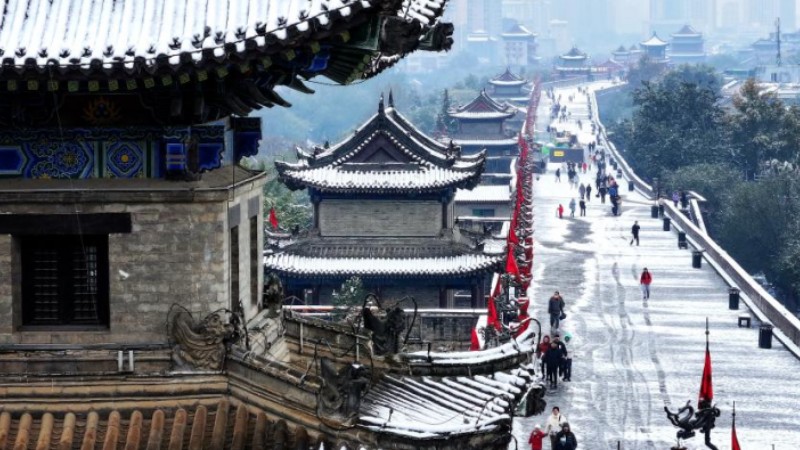Commentary: China-U.S. cooperation essential for respective development, common prosperity
BEIJING, Nov. 12 (Xinhua) -- "Peace and progress between China and the U.S. is in the self-interest of each country and of the world," former U.S. Secretary of State Dr. Henry A. Kissinger has said.
In stark contrast to the previous rhetoric of so-called "decoupling" or "de-risking" from China peddled by some U.S. politicians, recent new trends continue the positive interaction between China and the United States that has been going on for some time.
Starting with U.S. Secretary of State Antony Blinken's Beijing trip in June, several senior U.S. officials have visited China one after another, including Treasury Secretary Janet Yellen, Special Presidential Envoy for Climate John Kerry, Commerce Secretary Gina Raimondo and Senate Majority Leader Chuck Schumer. They have stressed the importance and willingness to stabilize China-U.S. relations.
Last month, the two countries' economic working group and financial working group held their first meetings via video link.
Moreover, continuous people-to-people exchanges have injected a steady stream of positive energy into the healthy development of bilateral relations.
China has resumed group tours to the United States as direct flights increased; a special 50th anniversary concert was held in Beijing to celebrate the Philadelphia Orchestra's 1973 visit to China; Chinese artists performed the dance drama "Mulan" at the Kennedy Center in Washington; and more than 200 U.S. exhibitors in various sectors have attended the sixth China International Import Expo, marking the largest U.S. presence in the history of the expo.
"Going forward, we need to find a right way for China and the United States to get along in the new era," said Chinese Ambassador to the United States Xie Feng at the Gala Dinner 2023 of the National Committee on U.S.-China Relations last month.
China and the United States are the world's two largest economies, representing one of the most important bilateral relations. Economic ties between the two countries are deeply intertwined. The two countries, and the world at large, cannot afford a miscalculation of each other's intentions and confrontation against each other.
"What worries me about the current period is that we are focusing too much on the rivalry and not enough on the cooperation," world-renowned U.S. political scientist Joseph Nye, also a former dean of Harvard's John F. Kennedy School of Government, said in July.
"We have to think of how do we reconcile both competition and cooperation at the same time. Because if we fail to do that, we're going to all suffer, not just the United States and China, but the world climate and the world economy," Nye said during a recent think tank forum in Beijing last month.
China's rise is an opportunity rather than a challenge to the United States. The two economies are far more complementary than competitive. The two countries should pursue win-win outcomes rather than a zero-sum game and make the pie of common interests even bigger.
"Despite the shouty rhetoric on both sides, the economic symbiosis remains strong, benefiting both U.S. and Chinese consumers," said an opinion piece published in the Financial Times, adding "overall trade between the two countries hit a record high last year."
"The continuing centrality of China to the U.S. tech sector has been highlighted this year by the long line of chief executives trooping through the country. Prominent among them have been Elon Musk of Tesla, Tim Cook of Apple, Pat Gelsinger of Intel and Cristiano Amon of Qualcomm," said the opinion piece.
An analysis by Nikkei Asia found that China still accounted for a significant share of these four U.S. tech companies' revenues last year: 62 percent for Qualcomm, 27 percent for Intel, 22 percent for Tesla and 18 percent for Apple.
Such mutually beneficial cooperation has helped American families reduce their cost of living and American businesses reap huge profits.
"This intensification of Sino-American economic ties is driven by the decisions of millions of American consumers and thousands of American businesses in the marketplace," said an Asia Times editorial. "It points to a natural co-evolution of the American and Chinese economies that governments should foster rather than try to frustrate."
History has proved that close cooperation between China and the United States is of great significance not only to the two countries but to world peace and prosperity.
"Cooperation between the U.S. and China will strengthen both countries and benefit the world," said Jeffrey Sachs, economics professor and director of the Center for Sustainable Development at Columbia University. "It is correct and indeed possible."
Amid geopolitical tensions, such as the ongoing crisis in Ukraine and fighting in the Gaza Strip, cooperation between the two countries is more urgently needed than ever before.
"The latest war in Gaza not only serves as a reminder to Americans that China is not a threat to America or world peace, but also offers an opportunity for Washington and Beijing to work together on common global challenges, including the conflict in the Middle East," said an opinion piece published in The Hill. "It's time to reboot America's China policy."
The achievements of China-U.S. relations have not come easily and should be cherished. Both countries should take a responsible attitude, proceed from the well-being of the two peoples, and properly handle and develop bilateral relations to continue the precious legacy of friendship.
The world is big enough to accommodate the development and prosperity of both China and the United States. The two countries should look forward, proceed from the Xi-Biden Bali summit towards a San Francisco summit, and push for the steady and sound development of China-U.S. relations in line with the three principles of mutual respect, peaceful coexistence and win-win cooperation.
If the two sides can approach each other to embrace dialogue over confrontation and tear down walls instead of building them, it will not be a daunting task for the two countries to join hands for common development.
Photos
Related Stories
- Xi's APEC trip to pilot China-U.S. ties, contribute to regional, global development
- 'The path to San Francisco': Highlights of China-US recent frequent exchanges
- Xiplomacy: A letter from Xi -- a fond memory of China-U.S. solidarity against fascism in WWII
- U.S. students participate in China Education Tour in Sichuan, SW China
- More signals of stabilizing ties urged
Copyright © 2023 People's Daily Online. All Rights Reserved.









